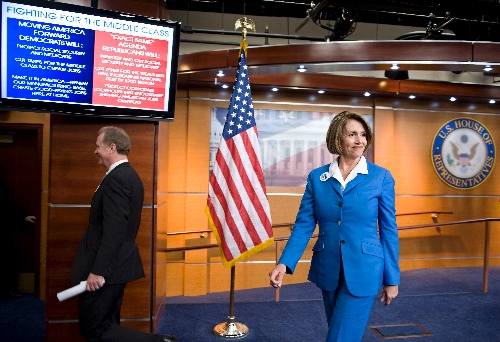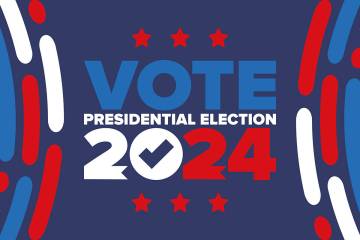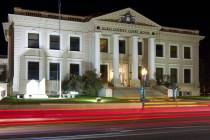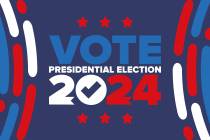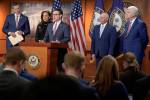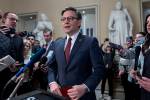House okays health care fund for 9/11 victims
WASHINGTON -- The House voted last week to provide medical care for rescue workers and other individuals exposed to harmful debris in the Sept. 11, 2001, terrorist attacks.
Lawmakers voted 268-160 to authorize $3.2 billion over eight years to monitor and treat illnesses stemming from toxic fumes and dust released at the World Trade Center site.
Another $4.2 million would be allocated to reopen the compensation fund for victims of the attacks whose illnesses did not become evident until after the fund closed in 2003. The fund closed in 2003, but bill sponsors said illnesses in a number of victims did not become evident until later.
"We have a moral obligation to treat those who became ill," said Rep. Jerrold Nadler, D-N.Y.
Sponsors noted rescue workers who risked their health came from all states. Responders to the attack on the Pentagon and the hijacked plane that crashed in rural Pennsylvania also would be eligible for care.
Rep. Peter King, R-N.Y., said the legislation was similar to one that provides health compensation to workers exposed to radiation and toxins during nuclear weapons production.
Opponents questioned the amount of spending, and said the legislation should be scaled back since more than $7 billion already had been paid out.
"I have no disrespect for the victims ... but I also have a sincere regard for the United States taxpayer, who is going to have to pay for this new entitlement program," said Rep. Joe Barton, R-Texas.
Republicans further complained the program would be paid for by limiting tax benefits to companies that avoid higher taxes by moving income outside the United States. They called it a job-killer.
But Rep. Charles Rangel, D-N.Y., called the tax provision "one of the most serious abuses that we have in the tax code."
Reps. Shelley Berkley and Dina Titus, both D-Nev., voted for the bill. Rep. Dean Heller, R-Nev., voted against it.
House passes intelligence bill
The House voted 244-181 to reauthorize the government's intelligence programs, after reaching a compromise with the Obama administration.
The compromise requires the president to report information on undercover activities to all members of the House and Senate intelligence committees within 180 days. But full briefings would be limited to a handful of leaders if the president cites national security reasons.
Congressional leaders had demanded more notification of covert activities, following charges the Bush administration had not fully briefed Congress on the most secret programs.
President Barack Obama and House Speaker Nancy Pelosi, D-Calif., said they were happy with the compromise. But during debate, Rep. Peter Hoekstra, R-Mich., the ranking Republican on the House Intelligence Committee, called it a "fig leaf."
"It says the administration still shall determine who shall be informed of what and when," Hoekstra said. "We had stronger language before."
In further dissent, Rep. Mac Thornberry, R-Texas, said the bill does not address key intelligence matters such as the fate of the detention camp at Guantanamo Bay, the release of detainees and the questioning of terror suspects.
Berkley and Titus voted for the bill. Heller voted against it.
Congress passes stopgap spending bill
Eager to return to their homes to campaign for re-election, lawmakers recessed after passing a temporary spending bill to keep the government running through Dec. 3.
The "continuing resolution" passed 228-194 in the House. Berkley and Titus voted for it. Heller voted against it.
The Senate vote was 69-30. Sen. Harry Reid, D-Nev., voted for it while Sen. John Ensign, R-Nev., voted against it.
Republicans used the debate to criticize Democrats for failing to complete work on a budget or any spending bills so far this year. Democrats responded that Republicans have dragged their feet all year, voting against most legislation for political gain.
Outsourcing bill blocked
In a vote emblematic of the gridlock that plagued the Senate in the weeks leading to the midterm elections, a Democratic bill in the Senate that sought to punish companies that send jobs overseas was blocked by Republicans. Democratic leaders failed to get 60 votes to move the bill forward.
The bill would have ended tax breaks on expenses companies pay when they shift work overseas, while offering firms a payroll tax holiday on jobs they return from abroad.
Reid, the Senate majority leader, said the bill was "simple common sense" to keep jobs in the United States.
Republican leader Mitch McConnell said the bill was "purely a political exercise" by Democrats looking for issues to bolster their campaigns.
The vote on the bill was 53-45. Reid voted for it while Ensign voted against it.
Contact Stephens Washington Bureau Chief Steve Tetreault at stetreault @stephensmedia.com or 202-783-1760.



